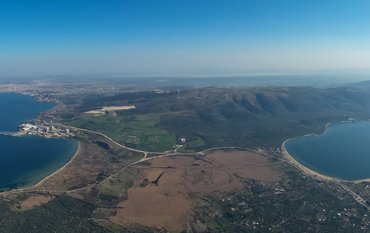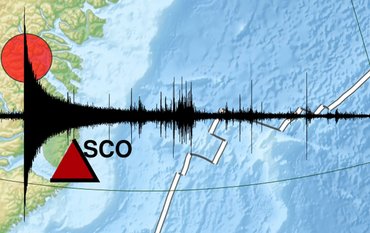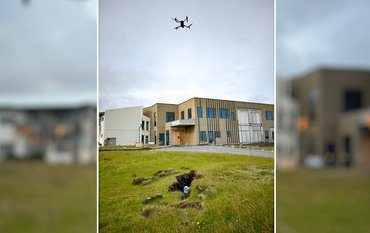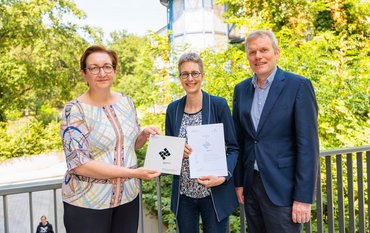Green hydrogen, produced with renewable energies, is to become a mainstay for achieving the climate goals. This is what the German government decided in its National Hydrogen Strategy 2020. This week, the state of development of technology, products and projects was discussed at the German Hydrogen General Assembly. A Perspectives paper now published in the journal Energy & Environmental Sciences focusses on the challenges and knowledge gaps in the underground storage of hydrogen on a large scale. According to the authors, this is essential if hydrogen is to fully realise its potential for achieving net-zero emissions. The paper was written in cooperation between GEO*8, an association of leading European geoscientific research organisations, including the German Research Centre for Geosciences Potsdam, and the Scottish HyStorPor project. The authors see an urgent need for interdisciplinary research to realise the safe and efficient underground storage of hydrogen.
The potential of hydrogen
Hydrogen is attracting global attention for its potential to help decarbonise transport, heating and energy-intensive industries, such as chemicals and steel-making. Critically, it can help alleviate a key drawback of renewable energy generation – its intermittency. Excess renewable energy can be converted to hydrogen through electrolysis (green hydrogen) and stored for use during periods of high energy demand.
Storage in underground reservoirs
To facilitate hydrogen supply on the scale required for a zero-carbon future, it must be stored in underground porous rock geological formations, such as saline aquifers and depleted oil and gas hydrocarbon reservoirs, the paper says. Despite the substantial opportunity provided by such storage, it is still largely untested and associated with numerous uncertainties and challenges. According to the authors of the study, this is mainly due to a lack of systematic research to date.
Important open questions
“The paper evaluates the emerging research on hydrogen storage, identifying the key challenges that must be addressed to enable global deployment,” says Dr Niklas Heinemann, HyStoPor researcher at the University of Edinburgh and lead author of the study. These include the flow behaviour of hydrogen in subsurface reservoirs, geochemical reactions enabled by the introduction of hydrogen, biotic reactions enabled by the presence of excess hydrogen, and the geomechanical response of the subsurface to hydrogen storage.
The risks posed by these processes could have severe economical and safety consequences on the storage operation. The processes discussed and their coupled influences provide the fundamental basis for reservoir-scale models to accurately assess and predict the impacts of seasonal hydrogen storage. These predictions can lead the way to informed decision making with regards to operational strategies to ensure safe and efficient implementation of such reservoirs.
Demand for systematic research
"We need multidisciplinary research to realise the safe, efficient and much-needed large-scale deployment of underground storage," says Jens Kallmeyer, head of the Aquatic Geochemistry Laboratory and member of the Geomicrobiology Section at GFZ. "This includes storage technology, chemistry, geology and microbiology."
This study goes back to a GEO*8 workshop held at GFZ in 2019.
Original study: N. Heinemann, J. Alcalde, J. M. Miocic, S. J. T. Hangx, J. Kallmeyer, C. Ostertag-Henning, A. Hassanpouryouzband, E. M. Thaysen, G. J. Strobel, M. Wilkinson, C. Schmidt-Hattenberger, K. Edlmann, M. Bentham, R. S. Haszeldine, R. Carbonell and A. Rudloff, Enabling large-scale hydrogen storage in porous media – the scientific challenges, Energy Environ. Sci., 2021. DOI: 10.1039/D0EE03536J
Further links:
GEO*8
HyStorPor
Scientific contact:
Dr. Jens Kallmeyer
Section Geomicrobiology
Helmholtz Centre Potsdam
GFZ German Research Centre for Geosciences
Telegrafenberg
14473 Potsdam
Phone: +49 331 288-28785
Email: jens.kallmeyer@gfz-potsdam.de
Contact GEO*8:
Dr. Alexander Rudloff
Consultant Scientific Executive
Helmholtz Centre Potsdam
GFZ German Research Centre for Geosciences
Telegrafenberg
14473 Potsdam
Phone: +49 331 288-1069
Email: alexander.rudloff@gfz-potsdam.de
Media contact:
Dr. Uta Deffke
Public and Media Relations
Helmholtz Centre Potsdam
GFZ German Research Centre for Geosciences
Telegrafenberg
14473 Potsdam
Phone: +49 331 288-1049
Email: uta.deffke@gfz-potsdam.de






![[Translate to English:] Martin Herold standing in front of the library on the Telegrafenberg](/fileadmin/_processed_/c/d/csm_Martin_Herold_d385ee4dd9.jpeg)
![[Translate to English:] Many people are listening to a presentation in the GFZ lecture hall.](/fileadmin/_processed_/c/a/csm_1_Bild1_hell_b9c0e9f5ed.jpeg)





![[Translate to English:] Both scientists sitting on stools in front of a wall of books in the Telegrafenberg library](/fileadmin/_processed_/6/6/csm_Buiter_Castell_DORA_4_e87cb1ea18.jpeg)
![[Translate to English:] Gruppenbild mit 4 Personen](/fileadmin/_processed_/8/d/csm_20241017_GFZ-Emmerman-Medal-005_web_reinhardtundsommer_21a414fa4a.jpeg)






![[Translate to English:] Ice landscape with five red tents](/fileadmin/_processed_/8/9/csm_Zeltlager_auf_dem_Eis_Urheberin_Jenine_McCutcheon_5ced2d523b.jpeg)











